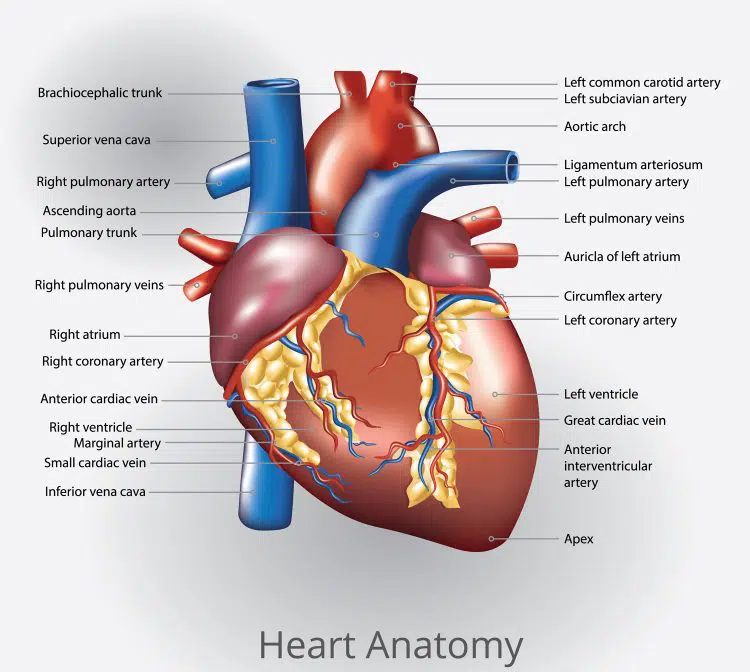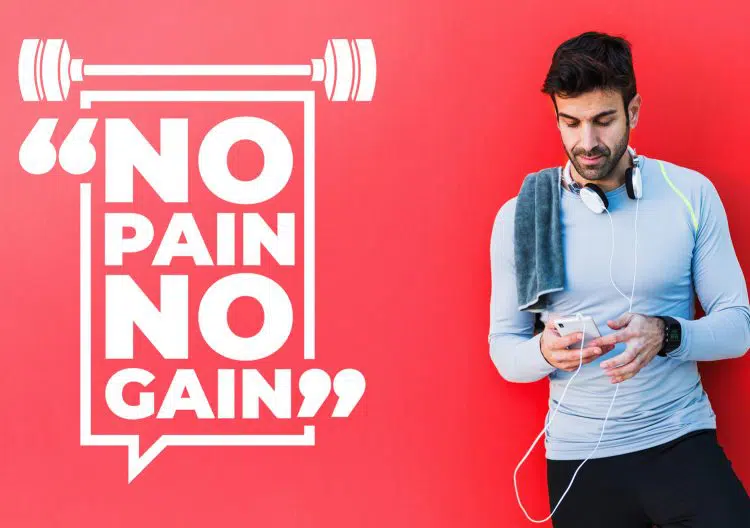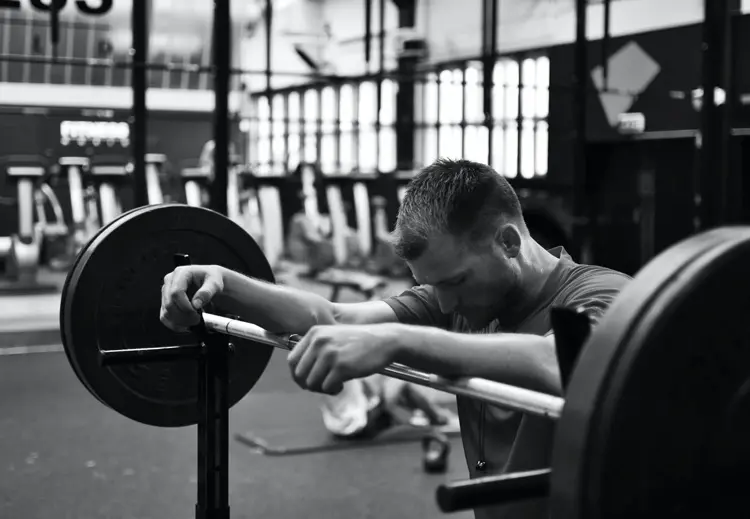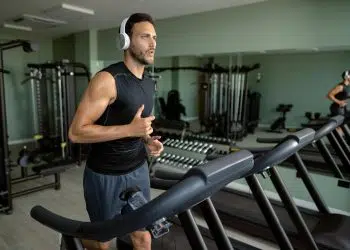There are 206 muscles in the human body, and each one is important. Most bodybuilders like to focus on the ones they can see, training them several times a week to make them bigger – a process called hypertrophy.
However, arguably the most critical muscle you’ve got is your heart.

Located slightly left of center in your chest and about the size of a clenched fist, your heart is a four-chambered muscle with one job – pumping blood around your body. It’s estimated that a heart beats over three billion times over the course of an average lifetime. Your heart keeps you alive, and if it fails, the consequences are dire.
Like every part of your body, the heart ages and deteriorates as the years pass. It’s also susceptible to illness and disease. That said, exercise can help keep your heart strong and healthy.
While all types of exercise are beneficial for your heart, cardio is arguably the best. When you do cardio, your heart rate increases. Over time, this makes your heart bigger and stronger. That’s why people who do a lot of cardio usually have a lower resting heart rate; their hearts can pump more blood per beat. Cardio is also good for your circulatory system and lungs and useful for weight loss too.
But how much cardio should you do? And how much is too much? We reveal the answers!
Level Up Your Fitness: Join our 💪 strong community in Fitness Volt Newsletter. Get daily inspiration, expert-backed workouts, nutrition tips, the latest in strength sports, and the support you need to reach your goals. Subscribe for free!
How Much Cardio Should You Do?
According to the U.S. Department of Health and Human Services and reiterated by the American Heart Association and the CDC, most adults should aim to do at least 150 minutes per week of moderate-intensity cardio per week, or about 30 minutes, five times a week (1).
Moderate-intensity activities include walking, jogging, swimming, recreational cycling, gardening, and aqua aerobics.
This is deemed to be the minimum amount of cardio necessary for general health and wellbeing, disease prevention, and improving quality of life. The same sources also state that 75 minutes of intense cardio per week (e.g., HIIT, circuit training, running, etc.) will have similar benefits (1).
Related: HIIT vs. LISS Cardio: Which One Is Best for Fitness and Fat Loss?
However, many people do a lot more than this, and with any type of exercise, you CAN have too much of a good thing. Look out for the following signs and symptoms, which could indicate that you are doing more cardio than you need.
Warning Signs You Are Doing Too Much Cardio
Everyone should do some cardio, even if your goal is to build massive muscles or get phenomenally strong. After all, it doesn’t matter how big your biceps are or how much weight you can bench press. If your heart is small and weak, it could shorten your life.
That said, doing too much cardio could harm your mental and physical health, leading to overtraining and other unpleasant side effects.
Warning signs that you may be doing too much cardio include:
1. Your resting heart rate is higher than normal
As you get fitter, your resting heart rate will come down. It could be as low as 40-50 beats per minute compared to the average, which is 72 bpm. However, if your resting heart rate is 10%+ higher than usual, this suggests that you’ve been overdoing the cardio, and your body is struggling to recover between workouts (2).
Get into the habit of taking your resting heart rate on waking. Track it over a few weeks to establish a baseline reading. Then, if it’s 10%+ higher than average, take that as a sign you need to take an unscheduled rest day to get back on track.
2. Your workout performance is declining
There is a fine line between doing enough cardio for optimal results and doing too much. If you notice that your workout performance is going down instead of up, you may be doing too much.
Monitor things like speed, distance, power output, duration, and heart rate, looking for any downward trends. You may even just feel that you’re having to work harder than usual.
These are all strong indicators that you aren’t recovering properly between workouts and should take a break to give your body a chance to rest and recover.
3. You’re losing motivation
Assuming you enjoy working out, you should look forward to almost every training session. After all, even when it’s hard work, you know you’ll feel great afterward and experience a feeling of accomplishment that’s hard to beat.
It’s normal to have the occasional off day, which is why pre-workouts were invented! But, if you dread working out and have been feeling that way for a while, you may be overdoing it.
Remember, exercise affects your body AND mind, and if your motivation is wavering, it could be because you’ve been overdoing things lately.
4. You are losing more muscle than fat
A lot of exercisers do cardio for weight loss. However, the goal should always be to lose fat while preserving muscle. That’s why we generally recommended a combination of cardio and strength training. This will improve your body composition, which is the relationship between your fat mass and muscle mass.
Doing a lot of cardio can lead to muscle atrophy and catabolism. In simple terms, you’ll start losing muscle. Yes, you’ll still lose weight, but losing muscle while retaining fat could mean you end up being skinny fat, which means you look slim but are actually soft and weak.
Doing too much cardio increases the production of cortisol, which is a catabolic hormone. Prolonged elevation of cortisol increases muscle breakdown (3). Less muscle means a slower metabolic rate, which makes burning fat more challenging.
If you are getting weaker or you can see you are losing muscle while retaining fat, you are likely doing too much cardio, even if you ARE losing weight.
5. You feel sore all the time
Delayed onset muscle soreness, or DOMS for short, is part and parcel of working out. It’s your body’s response to intense exercise. In general, the severity of DOMS decreases as you get used to your workout.
Even then, the occasional bout of DOMS is perfectly normal and just means your last workout was a little more challenging than usual.
That said, if you feel sore all the time, it’s a good indicator that you are overdoing it. DOMS should come and go. If it’s constant and affects the same muscle groups all the time, you probably need to take your foot off the gas and cut back on your cardio.
Level Up Your Fitness: Join our 💪 strong community in Fitness Volt Newsletter. Get daily inspiration, expert-backed workouts, nutrition tips, the latest in strength sports, and the support you need to reach your goals. Subscribe for free!
6. You’ve got minor injuries that never heal
Your body adapts to your workouts when you rest, and that includes healing minor injuries. A lot of exercisers ignore minor aches and pains in the hope they’ll clear up on their own, and often that’s exactly what happens.
But, if you have chronic injuries that aren’t healing, it could be because you aren’t giving your body the time it needs to repair and heal. If your aches and pains are persistent, some extra rest time may be beneficial. Remember too that a short break now could save you from a lot of time off in the future if your minor injuries turn into major ones.
7. Your sleep is disrupted
As mentioned before, doing too much cardio increases cortisol. Cortisol levels usually peak shortly after you wake up and gradually decrease throughout the day until they are lowest at bedtime. Doing too much cardio causes chronic elevation of cortisol, disrupting your circadian rhythm, which is what regulates your sleep/wake cycle (2).
Read: The Importance of Sleep for Building Muscle and Losing Fat
It’s one of life’s ironies that the thing you need more of when you do a lot of cardio can be so hard to come by if you’ve been overdoing it. If, even though you are tired, find it hard to get to sleep, wake up more often than usual, or wake up still feeling tired, it could be a sign that you are doing too much cardio.
8. You keep getting sick
Exercise is good for every aspect of your health, including immunity. Studies show that regular moderate exercise strengthens your immune system leading to fewer illnesses (4).
However, those same studies also show that doing too much exercise can suppress the immune system, leading to more frequent bouts of sickness. If you feel unwell or get sick more often than usual, too much cardio could be the cause.
Important Diet Habits To Implement For A Healthy Immune System
9. Your libido has taken a dive
If your sex drive has taken a dip, chronic cardio could be the reason. Those same elevated levels of cortisol mentioned previously can have a negative impact on testosterone levels, leading to a reduction in libido. In studies, high levels of regular cardio training are associated with a decreased libido scores in men (5).
Interestingly, short, intense bouts of exercise, such as HIIT and strength training, are more likely to increase testosterone and libido (6).
10. You are hungrier than normal
A lot of exercisers do cardio because they’re trying to lose weight. However, doing excessive amounts of cardio could increase your appetite, leading to overeating and negating some of the weight loss benefits of extra cardio (7). Prolonged cardio tends to increase cravings for carbs and sugar.
If you are hungry all the time or have powerful carb and sugar cravings, your cardio routine could be to blame.
So, How Much Cardio IS Too Much?
Thanks to the CDC, American Heart Association, and the U.S. Department of Health and Human Services, we know the minimum amount of cardio that most people should aim for – 150 minutes of moderate activity or 75 minutes of intense activity.
However, there are no recommendations for the maximum amount of cardio you should do.
That’s because individual cardio tolerances vary from person to person and what would almost kill one person is just another day at the office for another.
For example, ultra-endurance athlete David Goggins does the following every day, 5-7 days a week:
- Run – 10-15 miles (morning workout)
- Bike – 25 miles (ride to work)
- Run – 5-8 miles (lunchtime workout)
- Bike – 25 miles (ride home)
- Run – 3-5 miles (evening workout.)
Read also: Steady-State Cardio: Pros and Cons
Despite this HUGE training load, Goggins is lean, muscular, strong, healthy, and unsurprisingly, amazingly fit. It’s clear that he’s genetically programmed to thrive on lots of cardio. Of course, Goggins is training for things like 100-mile ultramarathons and other tests of endurance. It’s what he needs to do to excel at his chosen sport.

For someone else, doing 40 minutes of cardio a day could be too much, especially if that’s in addition to regular strength training or other types of exercise.
The point is to listen to your body and look for signs you are doing too much cardio. If you are experiencing adverse effects, it’s a safe bet that you aren’t recovering from your workouts as well as you should, and a reduction in cardio duration of frequency may be needed. Remember, too, that more is not always better and, if you are doing cardio for weight loss, it may be easier just to eat a little less instead.
Wrapping Up
If you want to live a long, healthy life, cardio is a must. It’s good for your heart, lungs, and circulatory system, lowers your risk of coronary heart disease, heart attack, and stroke, improves immunity, reduces your blood pressure, improves your blood lipid profile, reduces stress, and boosts your sense of wellbeing.
But, if you do too much, not only will you NOT experience these benefits, you may put your mental and physical health at risk.
Remember that exercise should be health and life-affirming, and if it’s affecting you negatively, you are probably overdoing it. Use and don’t abuse cardio, understanding that more is not necessarily better!
References:
1– American Heart Association: American Heart Association Recommendations for Physical Activity in Adults and Kids (source)
2– PubMed: Biochemical and Immunological Markers of Over Training (source)
3– PubMed: Exercise and Circulating Cortisol Levels: The Intensity Threshold Effect (source)
4– PubMed: The Compelling Link Between Physical Activity and The Body’s Defense System (source)
5– PubMed: Endurance Exercise Training and Male Sexual Libido (source)
6– PubMed: Strength Training as A Supplemental Therapy for Androgen Deficiency of The Aging Male (ADAM): Study Protocol for A Three-Arm Clinical Trial (source)
7– The American Journal of Clinical Nutrition: Effects of Exercise Intensity on Food Intake and Appetite in Women (source)

















